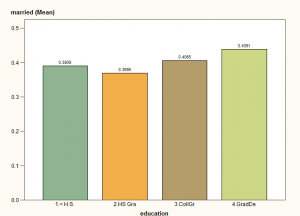My happy adventure with SAS on-demand
Before the semester began, I debated about requiring SAS on-demand for my statistics course. In fact, after giving it some thought, I decided to make use optional rather than mandatory. One reason for my hesitation was uncertainty about basing a major part of students’ grades on a project requiring an untested software package. I could see the possibility for disaster. Although it took a good bit of my time to prepare, that was NOT a major issue for me. When I was a full-time faculty member I was constantly frustrated by feeling I did not have enough time to do the best possible job for each of my classes and students. Now, by choice, I teach only once or twice a year, at most.
No, my other concern was that I might be requiring too much of the students. Many of them had never had a statistics course before this class. Out of 19 students, at most two or three of them had as much as one semester of Calculus. I breezed through descriptive statistics, covered correlation, ANOVA, multiple regression and logistic regression in depth, and touched on mixed models, survival analysis, factor analysis and a tiny bit of structural equation modeling and hierarchical models. On TOP of all of that, they were going to have to learn at least enough about SAS to run analyses on actual data and give a conference-type of presentation. It has been over a quarter of a century since I took my first graduate course in statistics. (That was back when people went to graduate school in their twenties and that was all they did. I know that seems quaint to you all today.) Maybe this is going to make me sound like one of those old fogeys who claim to have walked to school in the snow, uphill both ways.
 Still, the truth is that graduate school has become watered down over the past few decades. Professors are supposed to understand that students “have to work” and are not expected to give as much in the way of assignments so as not to unduly burden the paying customers – er, students. Students at many schools are either subtly or openly encouraged to “go hire a statistician” to help with their dissertations.
Still, the truth is that graduate school has become watered down over the past few decades. Professors are supposed to understand that students “have to work” and are not expected to give as much in the way of assignments so as not to unduly burden the paying customers – er, students. Students at many schools are either subtly or openly encouraged to “go hire a statistician” to help with their dissertations.
Honestly and truly, when I was in graduate school, I did not even have A CALCULATOR to do the homework problems in statistics because calculators were very expensive and I started graduate school with a preschooler and had two more babies my first two years. As my advisor grumpily said to me,
“Listen, I’m Catholic, too, but there’s such a thing as taking it to extremes.”
I was an industrial engineer and programming with SAS before I went back for a Ph.D. so I actually would telnet (remember telnet?) into the university server and run SAS programs to check my statistics homework problems, because graduate students got X number of hours on the computer for free (remember PAYING for computer time?)
I thought about it for a while and concluded,
“Screw it! These are doctoral students at a selective university. They’re getting a doctorate, and they’re smart. They ought to be able to do the work and they WILL learn something and get their money’s worth out of this course, whether they want to or not.”
As I said, this experiment could have turned out to be a disaster in many ways. The software could have not worked. The students could have complained to the administration about the work load. The administration could have told me I was being unreasonable.
It turned out that the software did require some advance preparation and extra work during the course. A lot of pre-processing of open data sets was done by me. However, by the third week of the course, the students had split into five groups for their research projects and every group had at least one person with a computer with SAS On-demand installed. Four out of the five groups ended up using SAS On-demand for their research. I strongly encouraged them to submit their research for presentation at the Western Users of SAS Software conference in September or the Los Angles Basin SAS Users Group this summer.
It also turned out that the students really DID want to get their money’s worth out of their courses. I heard from several of them off the record and let me just say that really bright students know whether they are being challenged or just passed through and their tuition checks cashed and they appreciated the former. This may well be because they are all working adults and could see the possibility of applying SAS skills and statistical analysis in a work setting, and they also see the competitive environment for employment right now.
The administration seems happy enough. I still get my checks direct deposited and invited to departmental parties, so I guess that is a good sign.
It WAS a happy adventure and the main reason, as I stated in an earlier post, is because of the kinds of research my students were able to do.
Let me just give you one example of what came out of this semester:
One group was interested in testing the hypothesis:
Are African-American women less likely to get married if they have more education?
The group members – three women, two of them African-American, thought that the answer was, “Yes”. Their first reason was that they thought some men might be intimidated by women with more education, and that statistics showed African-American women were obtaining degrees at a higher rate than men. Also, they thought women who had degrees might be less willing to “settle”, that they wouldn’t feel like they had to get married, so would be more likely to stay single.
My husband, the real-live rocket scientist (now retired as of a few weeks ago), disagreed vehemently when I told him about this. Here is evidence you are doing interesting research – that your professor discusses it at home and it leads to debates. He said they were looking at it from a woman’s perspective. As a man, he wanted a woman with an education, someone who was not boring and not looking at him as a meal ticket. He said that the women in the group were looking at it from a female perspective – women with more education may feel less need to get married. He thought they failed to consider the male perspective, which is that more men might WANT to marry them if they had more education.
So…. how did it all come out?
 As you can see, he was right. Of the women aged 18 – 65 years, 43.9% of those with a graduate degree were married versus 39% of those with less than a high school diploma.
As you can see, he was right. Of the women aged 18 – 65 years, 43.9% of those with a graduate degree were married versus 39% of those with less than a high school diploma.
Age is a confound here, however. Education has been rising for African-American women over the past few decades, so older women are more likely to be married (having had more years to get married) and less likely to obtain higher education.
So, the group conducted a logistic regression with marriage as the dependent variable and education, age and wages earned in the past year as the independent variables. They found that education was still a positive factor in predicting marriage after controlling for age and income.
The students used education as both a categorical variable and a continuous variable and found the same result.
Because this made me curious, I re-analyzed the data several ways, using women from age 16 and up, then age 18 and older. (Seriously, this is California, who gets married at 16?). I looked both at currently married (yes/no) and ever married (yes/no) and education was still significantly ( p < .0001) positively related to marriage. Earned income also consistently showed a positive relationship with the probability of marriage.
So, we have scientific evidence – men like smart women. Successful ones, too.
This is just one example of four groups that presented using SAS On-demand. I’ll try to get around to discussing others later.
Hopefully, you’ll see them at WUSS. Hey, if you’re one of those men seeking smart women, you should look them up – I know at least two of them are still single!